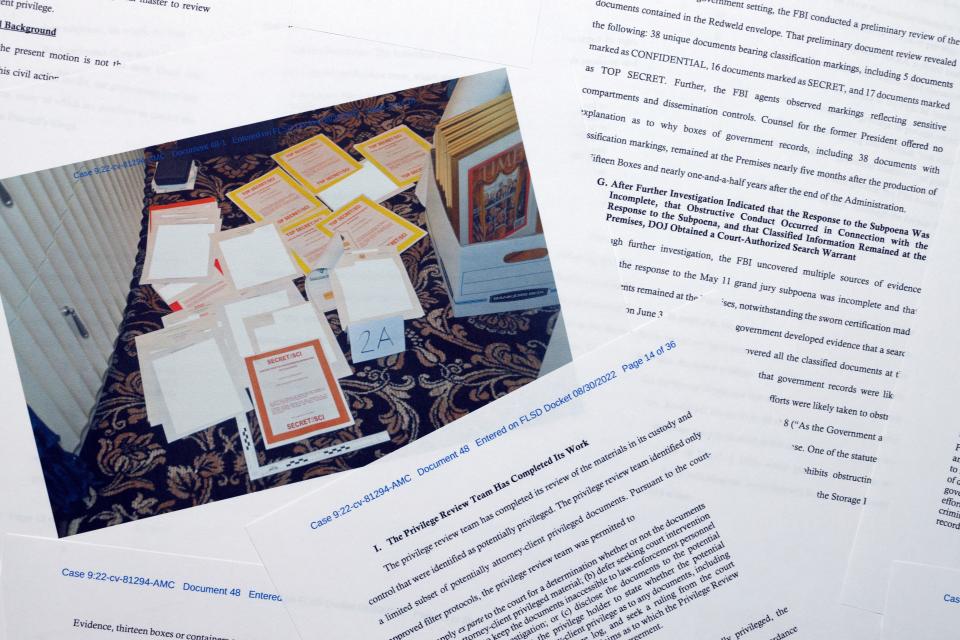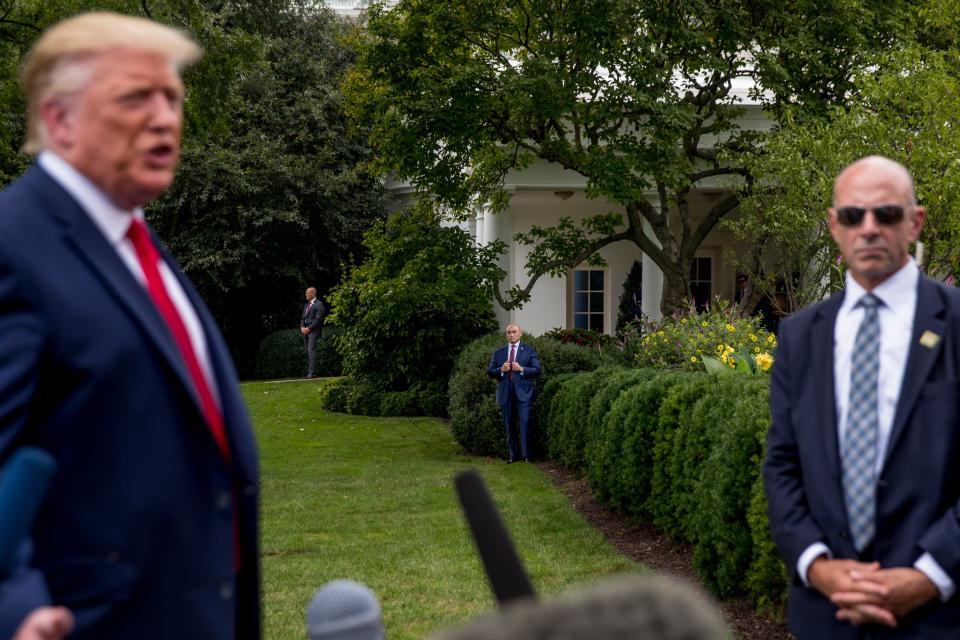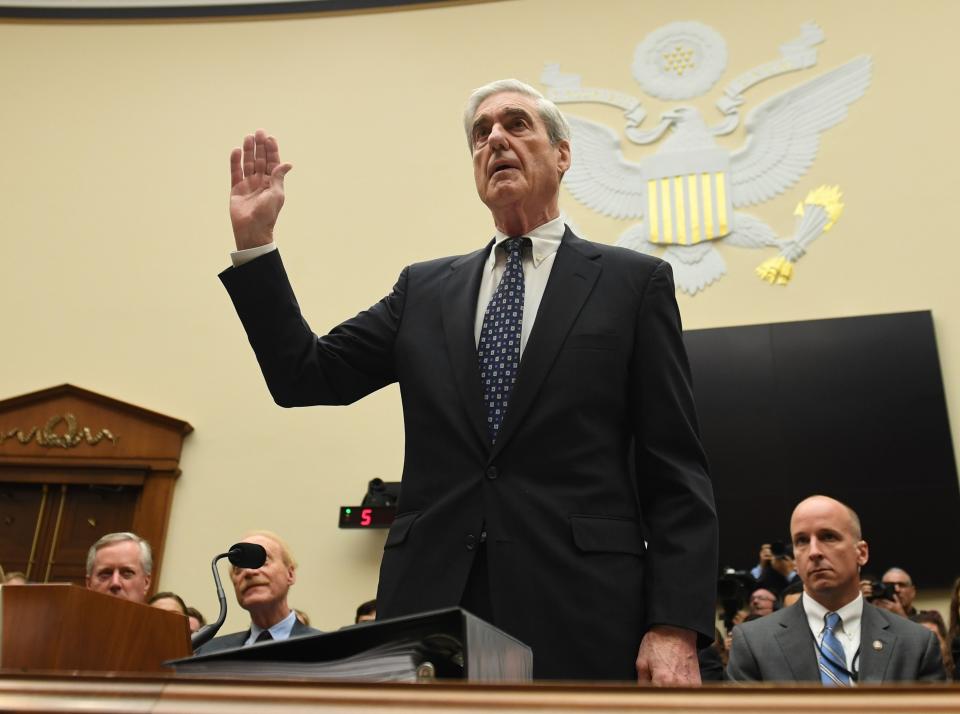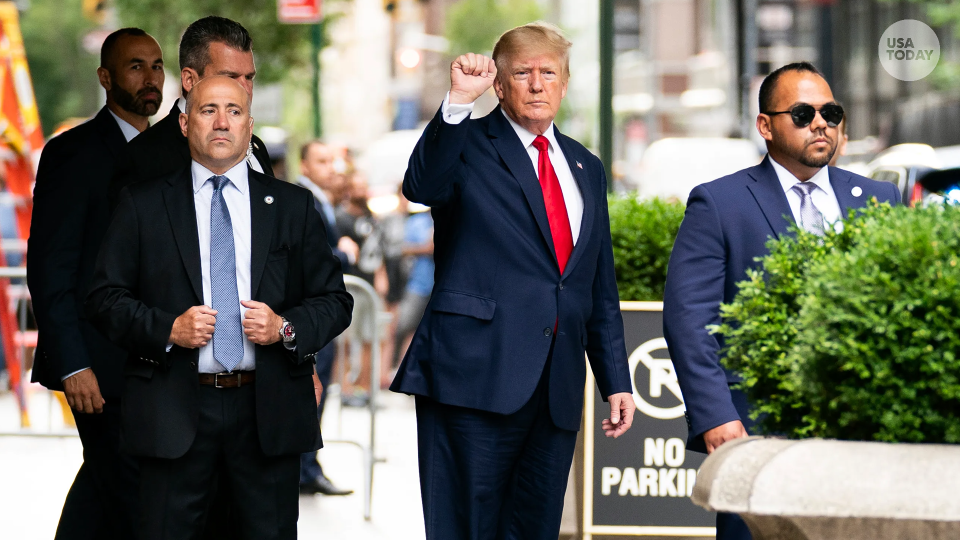Judge cites 'reputational harm' to Trump in ordering a Mar-a-Lago special master and pause in investigation
- Oops!Something went wrong.Please try again later.
- Oops!Something went wrong.Please try again later.
- Oops!Something went wrong.Please try again later.
A federal judge who ordered the appointment of a special master to review documents seized in last month's search of former President Donald Trump's Mar-a-Lago beach club repeatedly expressed concerns about the unprecedented nature of the law enforcement action, indicating that the ruling was necessary to promote a perception of fairness.
U.S. District Judge Aileen Cannon ruled that Trump's position as a former president meant the seizure of documents carried a stigma "in a league of its own" and that any future indictment "would result in reputational harm."
Cannon, who also called for a temporary halt to the federal inquiry until a document review is completed, asked Trump's team and the government to submit potential candidates for the special master role by Friday.
The decision raised several issues for the investigation into potential violations of the Espionage Act or obstruction of justice:
Although Cannon's decision came nearly a month after the Aug. 8 search, she voiced concern about maintaining a "perception of fairness."
Cannon ruled that Trump's position as a former president meant the seizure of documents carried a stigma and that any indictment "would result in reputational harm of a decidedly different order of magnitude."
Cannon's concern echoed special counsel Robert Mueller's reasoning in refusing to decide whether to charge Trump with obstruction of justice in the investigation into Russian interference in the 2016 election because he wouldn't have had a forum to defend himself.
National security lawyers said defense lawyers would be "salivating" over the decision because it favored defendants.
Will the Justice Department appeal? A department spokesman said the government was reviewing the decision.
Here is what we know about Cannon's ruling and its implications:

Federal judge cites need to promote 'fairness' in DOJ investigation
Throughout her ruling, Cannon acknowledged the high-profile nature of the investigation and the intense "public interest" as factors in her decision.
“Plaintiff ultimately may not be entitled to return of much of the seized property or to prevail on his anticipated claims of privilege,” the judge wrote. “That inquiry remains for another day. For now, the circumstances surrounding the seizure in this case and the associated need for adequate procedural safeguards are sufficiently compelling to at least get Plaintiff past the courthouse doors.
“A commitment to the appearance of fairness is critical, now more than ever.”

For the same reasons, Cannon determined that the government’s own team of screeners, which sorted the documents that may represent privileged attorney communications, was not adequate in a case of this magnitude.
The judge said Trump’s team had established the possibility of “irreparable injury,” and there was a risk that the government’s team “will not adequately safeguard Plaintiff’s privileged and personal materials in terms of exposure to either the Investigative Team or the media.”
"As a function of Plaintiff’s former position as President of the United States, the stigma associated with the subject seizure is in a league of its own," Cannon wrote. "A future indictment, based to any degree on property that ought to be returned, would result in reputational harm of a decidedly different order of magnitude.
“Plaintiff has shown, all in all, that the public and private interests at stake support a temporary enjoinment on the use of the seized materials for investigative purposes, without impacting the Government’s ongoing national security review,” Cannon wrote. “As Plaintiff articulated at the hearing, the investigation and treatment of a former president is of unique interest to the general public, and the country is served best by an orderly process that promotes the interest and perception of fairness.”

Mueller found potential obstruction but made no decision on charges
Mueller, the former FBI director who oversaw the Russia investigation, found several instances of potential obstruction of justice by Trump.
In his report, he cited incidents such as Trump firing FBI Director James Comey and urging Attorney General Jeff Sessions and White House counsel Don McGahn to stop Mueller's inquiry. Sessions and McGahn each refused.
More: DOJ mapped out strong obstruction evidence against Trump, aides in filing, experts say
But Mueller said charging Trump was "not an option" because Justice Department policy prevented charging a sitting president.
"Many of the president's acts directed at witnesses, including discouragement of cooperation with the government and suggestions of possible future pardons, took place in public view," Mueller's report said. "The president's efforts to influence the investigation were mostly unsuccessful, but that is largely because the persons who surrounded the president declined to carry out orders or accede to his requests."

Experts: Defense lawyers 'salivating' over decision favoring Trump
Legal experts said the decision seemed "very sympathetic" to Trump. Carl Tobias, a law professor at the University of Richmond, said that he expects the Justice Department to appeal the ruling but that the litigation would "greatly delay" the investigation.
"I think that the judge seems very sympathetic to Trump in nearly all of her rulings and much more so than for other defendants similarly situated," Tobias said. "She also seems to overstate the unprecedented nature of the case and understate the unprecedented nature of Trump’s behavior with national security and national defense documents."
Bradley Moss, a national security lawyer, said the ruling seems written for Trump alone.
"This is Cannon making a special exception to the case law just for Trump," Moss said in a tweet. "Criminal defense lawyers will be salivating over this analysis but every other judge will reject using it because this is meant for Trump and Trump alone."
Renato Mariotti, a former federal prosecutor, agreed that defense lawyers would cite Cannon’s decision because it represented a “significant” shift to defendants.
“Every defendant suffers massive reputational damage from an indictment," Mariotti said in a tweet. "I agree that we will cite this case law in other criminal cases, because if you take it at face value, it is a significant shift to the defense."
David Weinstein, a former federal prosecutor, said the judge appeared to be moved by an intent to “ensure a level playing field and the appearance of integrity within the ongoing investigation.”
“This is a temporary win for the former President and one that, after the review by the special master, could turn into an overall loss,” Weinstein said.
“While this also puts a pause on the use of this information in DOJ’s ongoing criminal investigation, it does not stop the evaluation of other evidence by the DOJ or their presentation to the grand jury,” he said. “Realistically, given the upcoming elections in November and DOJ’s internal policy on announcing indictments within 60 days of an election, it was unlikely that any significant charges related to this search would have been released before the end of November.”
The Justice Department did not immediately signal whether it would appeal the ruling.
"The United States is examining the opinion and will consider appropriate next steps in the ongoing litigation,” Justice Department spokesman Anthony Coley said.
This article originally appeared on USA TODAY: Judge sides with Trump for 'fairness' in review of Mar-a-Lago records

